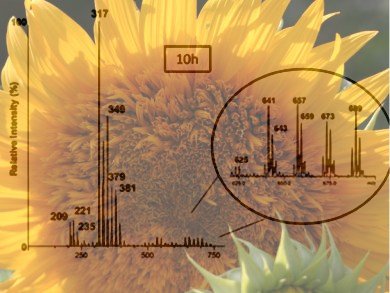Biodiesel is defined as a monoalkyl ester obtained by transesterfication between a lipid source, such as vegetable oil, and a short-chain alcohol. Since biodiesel contains unsaturated fatty acids, it is, compared to mineral fuels, more susceptible to oxidation processes caused by contact with air, light, and heat. Primary oxidation products are mainly hydroperoxides, which quickly decompose into secondary oxidation products, such as aldehydes, alcohols, dimers, and polymers. These products can cause engine damage.
Gustavo Pereira, University of Campinas, SP, Brazil, and colleagues used ambient sonic-pray ionization mass spectrometry (EASI-MS) in order to determine a more comprehensive set of biodiesel primary and secondary oxidation products in a simple, single-shot analysis. Traditional methods require two different methods for primary oxidation products (Rancimate test) and secondary oxidation products (high-performance size exclusion chromatography (HPSEC) or gas-liquid chromatography mass spectrometry (GLC-MS)). The comparison of results between EASI-MS and those traditional methods show that EASI-MS is suitable method for a rapid single-shot oxidation screening in biodiesel.
- Ambient sonic-spray ionization mass spectrometry for rapid monitoring of secondary oxidation products in biodiesel,
Gustavo G. Pereira, Rosana M. Alberici, Gabriel D. Fernandes, Ildenize B. S. Cunha, Marcos N. Eberlin, M. C. Dobarganes, Romeu J. Daroda, Daniel Barrera-Arellano,
Europ. J. Lipid Sci. Technol. 2014.
DOI: 10.1002/ejlt.201300482




